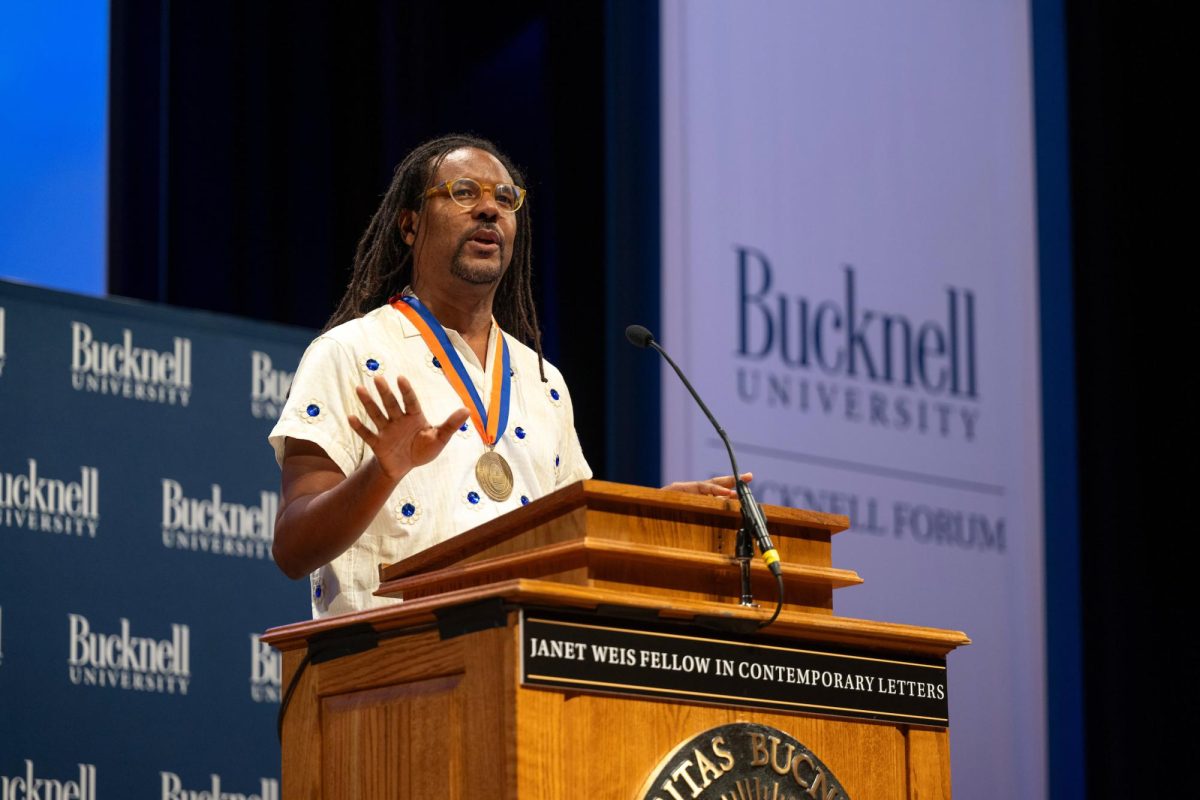As the 14th recipient of the Janet Weis Fellow in Contemporary Letters Award, Colson Whitehead took to the Weis Center stage this past Monday after an introduction and brief medal-bestowing ceremony from President John Bravman. Whitehead is the author of acclaimed works like “The Underground Railroad” and “The Nickel Boys;” Bucknell’s Class of 2028 was assigned Whitehead’s novel, “Sag Harbor,” as their summer reading. He was deemed “America’s Storyteller” by TIME magazine in 2019. His speech to the assembled students, faculty and staff captivated the crowd and covered topics from career to childhood.
Throughout high school, Whitehead dreamt of becoming a comic book creator. Though this goal would fade later in life, he still credits Stan Lee, a major contributor to the success of Marvel Comics, as one of his main inspirations for pursuing his literary passion. By college, Whitehead’s aspirations shifted to novels; he wanted to write “the Black ‘Shining,’ or the Black ‘Salem’s Lot.’ If you took any Stephen King title and put the word ‘Black’ in front of it, that’s what [he] wanted to do.”
Whitehead attempted to become a full-fledged writer during his sophomore year at Harvard University. However, this would prove difficult, as he was denied admission to a writing program twice after submitting “two, five-page epics.” After graduating, Whitehead accepted a job at The Village Voice, a newspaper in New York City, writing reviews for TV, music and books. His first “big break in journalism,” he recalls, was a “think piece about the series finales of the shows ‘Growing Pains’ and ‘Who’s the Boss.’” While Whitehead recognizes the irony of his first popular work, he doesn’t diminish it, as it led to the completion of his first novel.
Unfortunately, this first book received only rejections from the publishers he sent it to, an experience which he says was “good training for being a writer, because when you’re a writer, no one wants to read your crap. Everyone hates you.” Finally, in 1999, Whitehead published “The Intuitionist,” a fictional novel about difficulties faced in a city dominated by elevator-reliant skyscrapers. “The Intuitionist” jumpstarted his ongoing career as a bestselling author.
“Sag Harbor” was released in 2009. The novel tells the fictionalized, coming-of-age story of a teenage Whitehead and his friends while at his family’s vacation home for the summer. In his speech and later in the Q&A, Whitehead discusses why he wanted to write “Sag Harbor,” what his expectations were, and the novel’s lasting impact on him. “I really wanted to change what I was doing,” Whitehead recalls. “I’d written a bunch of books that are very chilly in terms of tone, cerebral… and I thought that it was important for me to grow as a writer. I [wanted to] write something more personal— have some skin in the game.” Writing “Sag Harbor” was difficult, and at first, he was nervous about what his real-life friends and family would think about their influence on his book. He pushed aside those worries and decided that “the most important thing was telling the truth,” but he also had to ensure an interesting plot and storyline for readers. Later, a member of the audience asked what the realest part of the book was; Whitehead admitted that the scene in which Benji—the main character based on Whitehead as a teenager—steals a six-pack of old coke from a party to hoard it, was inspired by something he had actually done.
Whitehead believes that “Sag Harbor” made him a better person and a better writer. He holds the novel very close to his heart: “Sag Harbor” preserves his family and friends between its covers. Many of them have passed away over the years. “[I] was trying to preserve a time and place,” he explains, going on to say that he wanted to “do some cultural anthropology” by writing.




















